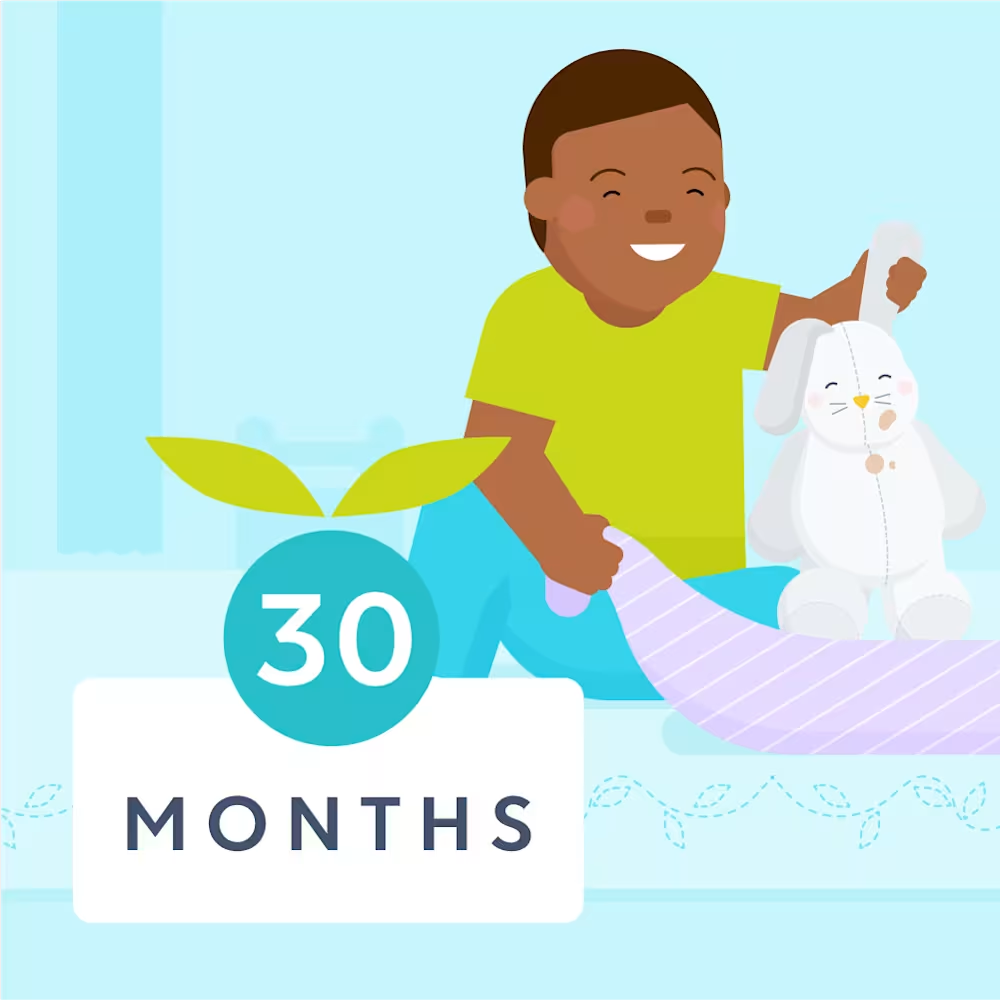29 month old toddler sleep schedule: Bedtime and nap schedule
Updated Dec 15, 2025

At 29 months, your toddler probably isn’t quite ready to give up napping. Whew! However, this is often an age where children experience sleep challenges, like nap strikes. If this is the case, your 2 year old may benefit from a slight sleep schedule adjustment.
In this article, we’ll provide tips for tweaking your toddler’s schedule, let you know how much sleep most children get per day, and answer common questions about sleep at 29 months.
How much should a 29 month old sleep?
At 29 months, children typically sleep around 10 - 11 hours overnight and nap for 1.5 - 2.5 hours during the day. These ranges fall in line with the American Academy of Sleep Medicine’s recommendations of 11 - 14 hours [] of total sleep per day for 2 year olds. However, we also suggest monitoring your child’s mood and energy levels when determining if they’re getting the rest they need. Some children need more or less sleep than others and that’s OK!
Here's a quick overview of what you may expect when it comes to 29 month olds and sleep. Note that these figures are averages and should be used as guidelines.
Top sleep tips for 29 month olds
If your child is suddenly experiencing a decline in sleep patterns, you may be wondering if they’re in a “.” When new sleep struggles arise (like difficulty falling asleep, frequent night wakings, and early rise times), we consider this a sleep regression. However, don’t occur at prescribed times — they can happen anytime! At around 2, sleep challenges may stem from all the growth and change children this age experience.
There are many factors that can lead to poor sleep at 29 months. For instance:
Physical and developmental milestones (like )
Life changes (, moving, or starting a new daycare)
Sleep challenges can be tricky for everyone! Here are a few suggestions that may help your child’s sleep get back on track:
Maintain healthy sleep hygiene habits (preserving )
Check to see if your child’s needs an adjustment.
Give it some time. Children often need a couple of weeks to master a milestone or bounce back from a period of separation anxiety or teething.
Sample 29 month old sleep schedule
Note: Sleep needs vary by child, and this chart should be viewed as an example.
Naptime schedule for a 2 year old
At this age, most children continue to , after around 5.5 - 6 hours of awake time in the morning. If your child is resisting naps at 29 months, this may be a sign that they’re ready for a bit of a schedule change. For example, if they normally nap at noon, consider pushing their nap time to 12:30 PM to see if it’s easier for them to fall asleep with a slightly longer wake window in the morning.
Most children aren’t ready to completely until closer to 3, so we recommend continuing to offer a daily nap to your child even if they’re on a nap strike. Dropping the nap too early can often lead to increased night waking and/or early rising.
How long should a 2 year old nap?
Toddlers typically nap for 1.5 - 2.5 hours during the day. However, sleep needs vary for every child so it’s OK if your child's sleep durations are more or less than this during the day.
Note that if naps are very short or long, this may impact overnight sleep. For example, toddlers who take a long or late afternoon nap may not be tired enough to fall asleep at the desired bedtime. On the other hand, 2 year olds who take short naps may need their bedtime adjusted earlier to avoid becoming overtired, which can make it difficult for kids to fall asleep and stay asleep.
How many naps for a 2 year old?
A is common at 29 months. We typically see wake windows of around 5.5 - 6 hours in the morning before a 2 year old’s nap. We suggest offering lunch before your child’s nap to help prevent them from having a very early wake-up time due to hunger.
1-nap schedule
Note: Sleep needs vary by child and this chart should be viewed as an example.
1-nap schedule with shorter nap/early bedtime
To avoid overtiredness, we recommend shifting bedtime earlier on days when a child has not slept at all. If your little one becomes too tired during the day, they may struggle to fall asleep and stay asleep overnight.
Note: Sleep needs vary by child and this chart should be viewed as an example.
Bedtime for 29 month olds
If bedtime has become tumultuous at your house, rest assured you’re not alone. Although frustrating, like stalling and meltdowns are typical at this age []. We recommend setting age-appropriate boundaries so your child feels secure and confident about what comes next and offering reasonable choices [] (like picking the bedtime story or pair of pajamas) to give your toddler a sense of control.
Your child also may do well with a longer bedtime routine at this age. It’s normal and developmentally appropriate for 29 month olds to need around 45 minutes in dim light to wind down and then fall asleep quickly. This lengthened routine could begin earlier to maintain your little one’s normal bedtime or it may be an opportunity to shift bedtime a little later if they don’t typically seem tired when it’s time to say goodnight.
Once the lights are turned off, most kiddos need 10 - 20 minutes to fall asleep.
What time should a 29 month old go to bed?
One benefit of a regular bedtime is that it helps to regulate the body’s internal clock, which improves sleep quality and leads to more restful sleep. A consistent bedtime that allows for around 6 hours of awake time after your toddler’s nap and 10 - 11 hours of overnight sleep is ideal. For example, if your toddler typically wakes up around 6:00 AM, bedtime will likely be around 7:00 - 8:00 PM. You know your child best, though! Some children do better with earlier or later bedtimes and that’s OK.
Why does my 29 month old keep waking up at night crying?
If you've found yourself searching why your 2 year old suddenly seems to be having more sleep challenges, you're not alone. At this age, toddlers are busy testing boundaries, reaching new milestones, and navigating big changes (like welcoming a sibling or starting a new daycare). They might also be dealing with those pesky molars coming in! Any of these factors, or a mix of them, can contribute to sudden night wakings and other sleep hiccups. If you’re looking for more sleep support, consider submitting for a personalized, step-by-step Sleep Plan via .
Is there a sleep regression at 29 months?
Sleep regressions can occur at any age and aren't tied to a specific date on the calendar — there aren't only . Around 2 years old, many toddlers experience new sleep struggles, such as resisting naps, super early wake-up times, or waking up more frequently at night. You may have heard of the "," but it's important to remember that not all toddlers will go through this phase. And if they do, it's typically tied to things like milestone development and other big changes as your little one grows.
Can I sleep train a 29 month old?
Sleep training shifts as kiddos grow, however the core goal stays the same: helping them learn to fall asleep independently. Sleep training at 2 often focuses more on clear routines, age-appropriate expectations, and positive reinforcement. Many children adjust well with consistency and support, leading to better sleep all around.
Can my 29 month old sleep with a pacifier?
At this age, it's common for caregivers to start thinking about phasing out the pacifier. The American Academy of Pediatric Dentistry advises against prolonged pacifier use into toddlerhood and beyond, as it can affect the development of a child's facial structures and mouth. Issues like an anterior open bite (when the upper and lower front teeth don't meet when the mouth is closed) and other dental concerns may arise, which could eventually require orthodontic treatment [].
However, we also advise considering your child's sleep. Many toddlers still rely on a pacifier for naps, and removing it too soon can lead to nap resistance or even cause them to drop their nap, which could introduce new sleep challenges at night. If your child still uses a pacifier for sleep, we typically recommend waiting until after age 3 to remove it, when their sleep patterns are more established and they’re better able to manage without it.
Can a 29 month old sleep on their stomach or side?
If your 29 month old falls asleep on their side or stomach and can easily move on their own, it’s OK to go ahead and leave them in these positions.
What are the developmental milestones for a 29 month old?
At 29 months, it's normal for kiddos to be working on milestones in some areas and moving towards milestones in others. There’s a wide range of normal at this stage of development and that’s normal.
Here are some things your child may be trying at 29 months:
Turns a single page of a book
Holds and crayon and scribbles spontaneously
Stacks 4 blocks by 24 months and 10 blocks by 36 months
Says 200 - 1,000 words by 3 years old
Uses short sentences and phrases
Starting to name body parts and animals
Expresses a range of emotions
Notices when other people are upset or hurt
Says “no!” frequently and has temper tantrums
Engages in parallel play with other children
Does a 29 month old need to eat during the night?
Eating overnight is typically . Consider offering a healthy pre-bedtime snack to help them stay full until breakfast if your toddler is waking up hungry during the night (or very early in the morning). Try cheese and crackers or peanut butter on toast, for example.
Takeaway
At 29 months, children typically sleep around 11 - 14 hours per day. This often includes 10 - 11 hours of overnight sleep and 1.5 - 2.5 hours of sleep during a midday nap.
Most children aren’t actually ready to stop napping at 29 months, even if they have periods of resisting sleep and/or skipping naps. We recommend continuing to offer a daily nap after around 5.5 - 6 hours of awake time in the morning.
If your child is experiencing sleep challenges, consider evaluating their sleep schedule. Some are able to stay awake for longer periods and may benefit from a schedule adjustment at this age. This may look like more awake time before their nap, a longer pre-sleep routine, and/or a slightly later bedtime.
If you're curious about what lies ahead in the coming month, glimpse into the future to see what you might experience when your little one is on a . Or take a look back at a .
Share article:
Note: The content on this site is for informational purposes only and should not replace medical advice from your doctor, pediatrician, or medical professional. If you have questions or concerns, you should contact a medical professional.
3 Sources
Share article:







